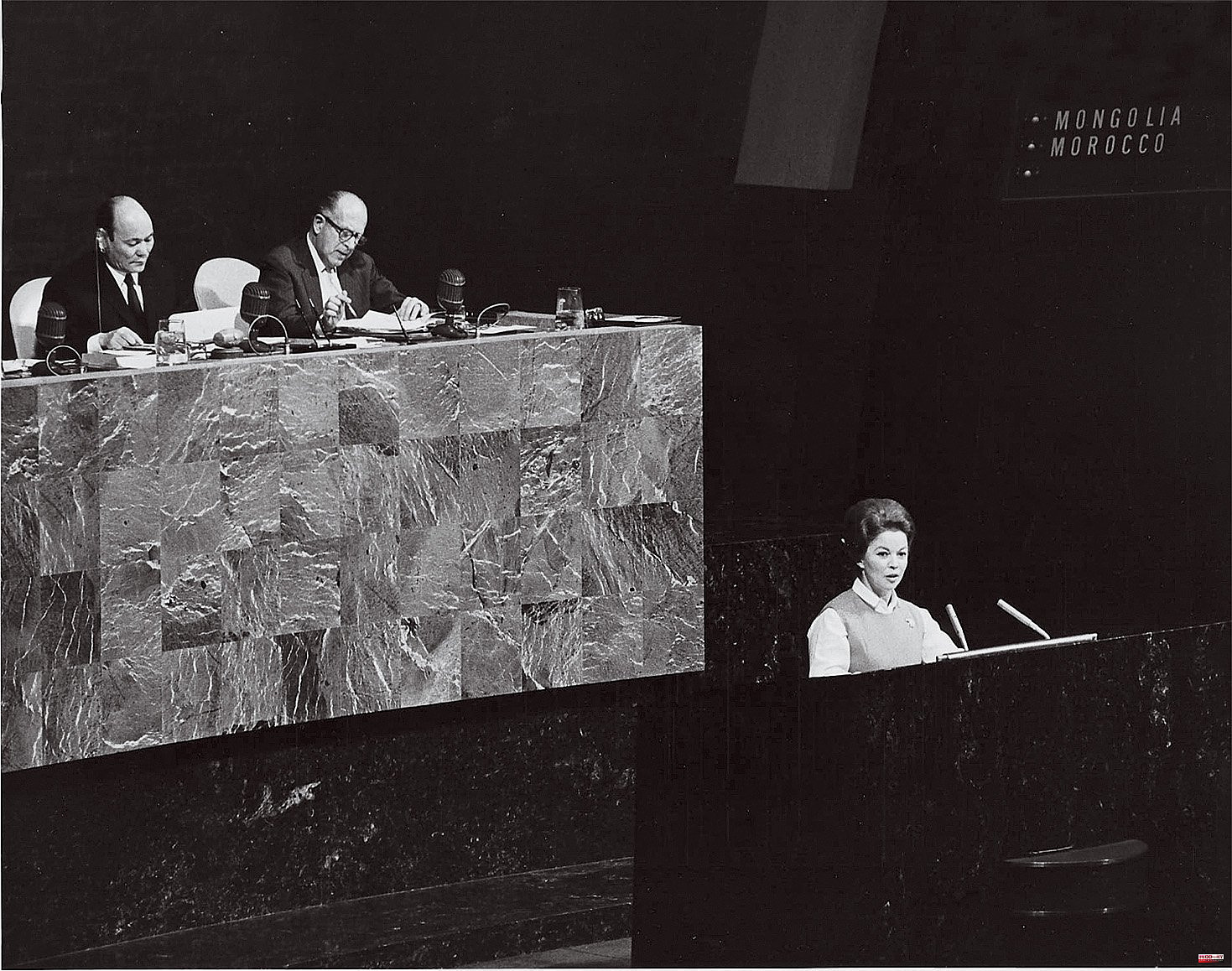Shirley Temple Black was appointed United States delegate at the United Nations Conference on the Human Environment in June 1972. Tap-dancing child star, with her magnetic appeal and golden ringlets, was 44 years old. She was an obvious presence at the Stockholm first international meeting to address global pollution crisis. According to the San Francisco Examiner, you could often find her by watching for flash bulbs popping and shutters clicking. Black's fame was not enough. Black had come to share an all-inclusive message that still seems relevant 50 years later. She said that people must come together with empathy and humility to save the world for the future. "We are the trustees of the earth they will inherit."
Shirley Temple was America's antidote during the Great Depression of the 1930s. She appeared on screen for the first time at age 3 when she was still a toddler. Her early success as a child star was a fortunate one. She had been discovered by film producers in a Los Angeles dance class. But she refused to let her childhood stardom define her adult life. After marrying Charles Black, an aquaculture engineer, oceanographer, and having three children, Black began a new career as a foreign affairs specialist. In 1969, President Richard Nixon enlisted her as the United States' delegate to United Nations. Black was the first female U.S. ambassador in Ghana and also the first chief of protocol at State Department. She was also the first U.S. Ambassador to Czechoslovakia where she witnessed the 1989 Velvet Revolution, and the fall of communism.
Black's account of her 23-year career as a diplomat has been kept private. It is now contained in an unpublished autobiography called All Grown Up: My Story. Black's first memoir, Child Star was published in 1988. A portion of Black's childhood at the U.N. is described by her children, Charlie Black and Susan Falaschi. It includes her early days and her pioneering role in the planning and execution of the Stockholm Conference. These efforts are long overlooked. Black tells the story of how the world's most famous child actress managed to enter politics, navigate the greatest threats to the planet, and become a stateswoman. Black's unique experience as a performer was a benefit. She was indefatigable, skilled at dialogue scripted and off-the-cuff. This earned the U.S. delegation to Sweden the celebrity distinction. Her story reveals that Black's fame didn't guarantee her success as diplomat. She loved to tell us that "The name Shirley Temple still opens doors for my,". "But Shirley Temple Black must perform or the doors may close." Black's story is a window into environmental diplomacy's birth and a reminder that each one of us has to reimagine ourselves in order to deal with global threats to the environment.
Shirley Temple Black arrived in Manhattan at the U.N. headquarters just as member countries were discussing Sweden's invitation for a conference on human impact on the environment. Although her role as U.S. delegates was broad, Black recognized a particular urgency in the environment crisis. She first wrote and presented a policy statement for the U.S. delegation, then delivered a passionate closing speech at U.N. 24th General Assembly's plenary session that December. Black spoke out against a "worldwide pollution cauldron" and urged nations to embrace a new environment ethic that values nature, compassion, and cares about the future. She stated that we must stop being apathetic and self-absorbed.
Black understood that she had to be strong against men who saw her as a distraction in order to be successful in international affairs. Black was confronted in 1970 by Christian A. Herter Jr. at U.N. headquarters, New York, during a preparatory meeting to the Stockholm Conference. He was director of the State Department’s Office of Environmental Affairs and would be vice-chair of the U.S. delegation. She spares no expense in mentioning Herter's "particularly unpleasant pipe" and dismissive attitude. "He had ignored my introductions but then turned to me and said, with a patronizing smile: "And now, Madam. Deputy, will your kindly accept our requests for coffee?" It's possible to bring it down the hall from the machine.
"Macho attitutdes often fall prey to hard work."
Black was a valuable member of the team. The media paid close attention to what she said. However, she felt that she was being held back in the build-up to Stockholm. Among other frustrations she experienced, higher-ups frequently neglected to send crucial data to her that the rest the team had been studying. "Repeated phone inquiries to the chairman resulted in apologies but no improvement. So I had to continue working with outdated data.
Black was irritated by the constant insults but she resisted them with skill. She writes that macho attitudes are often defeated by hard work, humor and a lack of resentment. Black's determination and obvious diplomatic instincts eventually silenced the doubters. "As people got the chance to get to know her, some the most toughest and battle-hardened professional diplomas, American as well as other, realized how capable they were," states Norman Eisen, a diplomat and attorney who was appointed U.S. ambassador in 2011. He followed in Black's footsteps. Black assumed the role of leader when the chairman of the U.S. delegation left the second preparatory conference early. Black's ability to communicate with people and her natural talent for navigating the drama of international affairs helped her show her creativity and open-mindedness. Black, unlike other American leaders who sought traditional European allies for their support, made connections with representatives of developing countries "from Afghanistan and Zambia", as she writes in her manuscript.
In June 1972, the Stockholm Conference was opened to 1,200 delegates representing 113 of the 132 U.N. member states. There were also more than 250 non-governmental organizations and large crowds of journalists. The king of Sweden, the Prime Minister of India Indira Singh, and even Wavy Gravy, an entertainer and Woodstock activist, were among those in attendance. They rallied a group young environmentalists who gathered around the city's outskirts. Because East Germany was excluded as a non-U.N. Member, the Soviet Union and other Warsaw Pact nations boycotted this conference. China attended the meeting, and its delegation chair Tang Ke accused the U.S., other "imperialistic suprapowers", with having destroyed the world while condemning the U.S. for its actions in Vietnam.
Black, the U.S. delegation chair that day, rose to the occasion to help navigate these impasses as they threatened to halt the negotiations. She displayed acting skills and remained passive, even though her mind was full of possibilities. She writes that she was faced with many choices. She writes that she tried to imagine (but failed to choose) a more dramatic scenario. "Walking deliberately, raising one hand in the V signal and saying one word peace, I tried to think of a better way to express my feelings.
Black kept cool in a heated press conference, which included a question about China's claims. One reporter asked Black about the U.S.'s use of napalm. She recalls that her knees were knocking with reason. Eye contact was ineffective. It was necessary to suppress my natural talent for humor. "Questioners were impatient to hear platitudes," Black said. She avoided defensiveness and instead focused on transnational values, which are the importance of universal stewardship. She said to reporters that she was still looking for an environmental ethic in her country and all other countries. She wrote in her memoir: "It was the largest, most impressive and most frightening press conference I have ever attended in my long career."
Black assisted in removing any bottlenecks created by the conference's final document, the Stockholm Declaration. She writes that she argued for compromise "middleway between passions and timidity"--a strategy that worked. Despite China's aggressive rhetoric, the conference established the first set global environmental principles calling on worldwide cooperation. These principles would guide all international environmental diplomacy up to the 1992 Earth Summit in Rio de Janerio. They would eventually lead to the Paris Agreement which was adopted in 2015. Other important decisions were made by the Stockholm delegations, including the proposal of a ten year moratorium on commercial whaling and the establishment of U.N. The Environment Program quickly became the world's governing body for the environment, and has been a key part of efforts to limit global warming.
One of Stockholm's most important, but least remembered, undertakings was a petition. It was initiated by Margaret Mead, an American anthropologist, and Barbara Ward, a British economist, and championed Black. The petition called for "radical changes" in the participation of women in environmental policy-making. Only 11 of the 113 countries represented at the meeting had a single woman, according to the document. Black made international news by highlighting this gender imbalance: Shirley Temple Black Backs Woman Power, the Associated Press reported at the time the petition circulated.
The world has witnessed a remarkable number of women following the Black example fifty years later. Christiana Figueres from Costa Rica, a former U.N. head, was the most recent example. Framework Convention on Climate Change was the director of six international gatherings. They began in Cancun, 2010 and culminated in the Paris Agreement. Patricia Espinosa, Mexico, is now Figueres's successor. Yet, women still make up a small percentage of global gatherings. A U.N. report was published before the U.N. Climate Change Conference (COP26 in Glasgow) found that only 33 percent of all party representatives were women in 2021.
Black was invited to speak at the plenary session for the U.S. delegation on the last day of Stockholm. She described it as an "unexpected" honor that showed how her skeptical colleagues had changed. She repeated her call for fundamental changes in values and stressed the need to have everyone share responsibility. She stated that man, with all the amazing and horrible powers science has given him, is in greater need of an ethic to guide him. "The environmental warnings that we see around are warnings to not only our engineering skills but also to our spirits," Black wrote. She died at 85 in 2014.
She encouraged Americans to write letters and get involved with conservation groups. She once stated that without an active public, "all of our potential will be worth one penny," one piaster, one pennies, one yen, and one fen." Her authenticity is what attracted her followers. Charlie, her son, says that although his mother wasn't a scientist, what she brought, and what she always brought, was a clear, communicateable concept.
The moment governments started to take serious measures to protect the ocean's largest animals
This article is taken from Smithsonian magazine's June issue.












